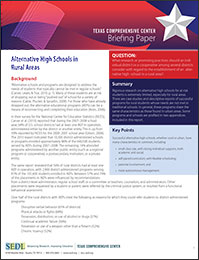Alternative High Schools in Rural Areas: Texas Comprehensive Center Briefing Paper, Number 3

Authors: Texas Comprehensive Center at SEDL, Shirley Beckwith, Cathie McQueeney
| Price: Available free online |
Available online: Full text, PDF
![]()
This brief addresses the question: "What research or promising practices should an individual district or a cooperative among several districts consider with regard to the establishment of an alternative high school in a rural area?"
Rigorous research on alternative high schools for at-risk students is extremely limited, especially for rural areas. There are case studies and descriptive reports of successful programs for rural students whose needs are not met in traditional schools. In general, these programs share the same characteristics as those found in urban areas. Some programs and schools are profiled in two appendices included in this report.
Key Points
Successful alternative high schools, whether rural or urban, have many characteristics in common, including
- small class size, with strong individual supports, both academic and social;
- self-paced curriculum, with flexible scheduling;
- parental involvement; and
- more autonomous management.
